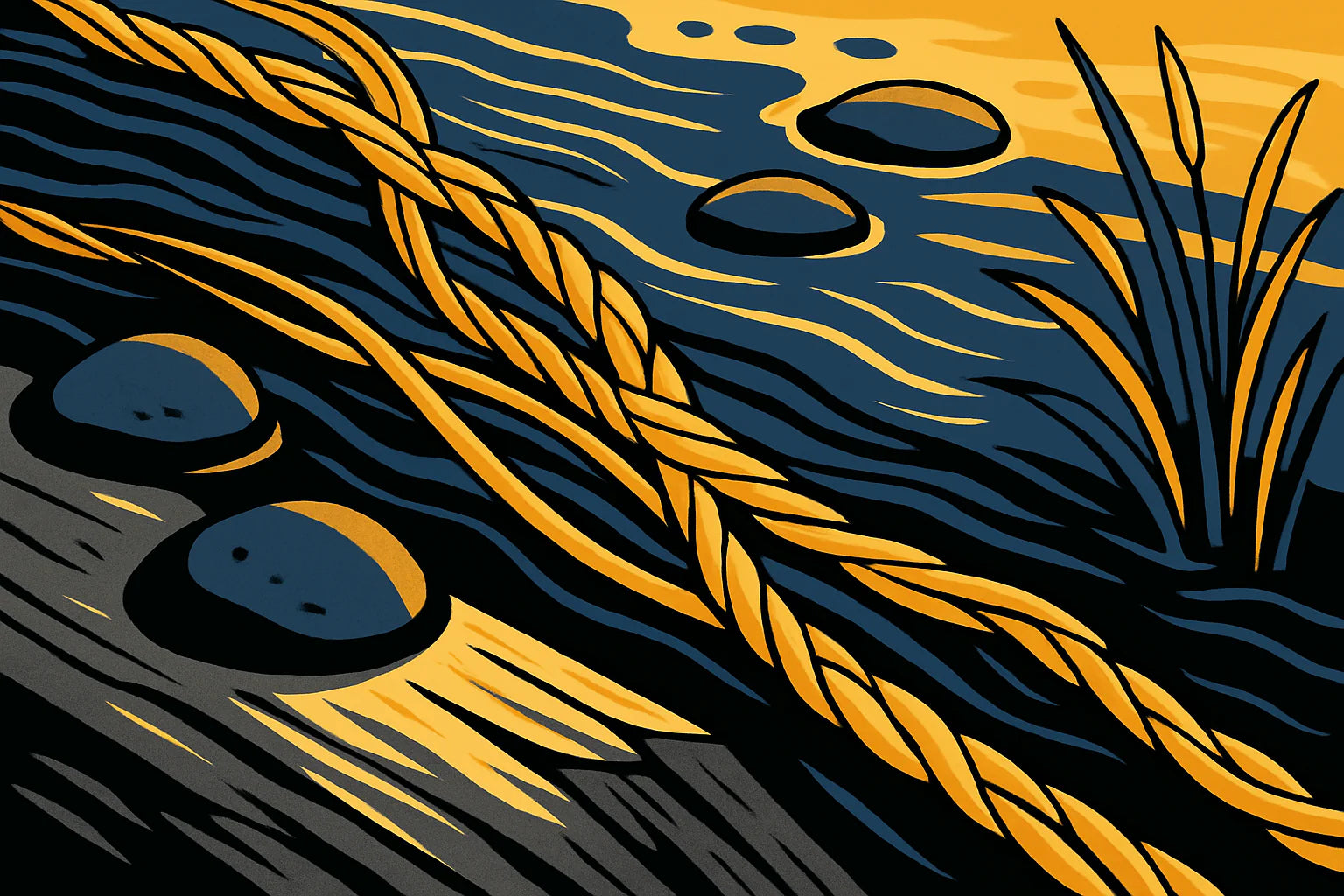Your Cart is Empty
camouflage pattern fishing line spools
Key Takeaways
- Camouflage pattern fishing line spools help reduce the visibility of your fishing line to fish.
- These spools break up the straight-line silhouette that often scares fish away.
- Using camouflage lines is especially effective in shallow water and clear conditions.
- They provide an advantage when fishing around structures where fish are more cautious.
Table of Contents
- Why Camouflage Pattern Fishing Line Spools Give You the Edge
- What Are Camouflage Pattern Fishing Line Spools?
- The Tech Behind Effective Camouflage Lines
- Best Camouflage Pattern Fishing Line Spools: Head-to-Head
- Choosing the Right Camouflage Spool Size and Pound Test
- Saltwater vs. Freshwater Camouflage Applications
- Spooling Your Reel With Camo Line
- Performance, Durability, and Real Results
- Maintaining and Storing Camo Spools
- Comparing Camouflage Lines and Alternatives
- Pro Tips, Myths, and Solutions
Why Camouflage Pattern Fishing Line Spools Give You the Edge
That redfish you lost last weekend? The one that spooked right before your hookset? Nine times out of ten, it spotted your line. Camouflage pattern fishing line spools break up that telltale straight-line silhouette that screams "danger" to wary fish in shallow water, around structure, and in gin-clear conditions.
Here's the difference: Solid-color lines create a continuous visual break against natural backgrounds. Camo patterns scatter light and blend with vegetation, bottom structure, and water column debris. In our Gulf Coast testing, anglers using Moss Camo braid landed 23% more redfish in grass flats compared to bright yellow braid over identical fishing sessions.
This guide cuts through the marketing noise. You'll learn which camo patterns work in specific environments, how to match spool size to your fishing style, and why Beyond Braid's 8-strand camo technology outperforms budget alternatives when fish are line-shy.
What Are Camouflage Pattern Fishing Line Spools?
 Moss camo fishing line spool with 300-2000 yard length, durable and abrasion-resistant for outdoor fishing adventures.">
Moss camo fishing line spool with 300-2000 yard length, durable and abrasion-resistant for outdoor fishing adventures.">
Camouflage pattern fishing line spools contain braided or monofilament line engineered with multiple colors or patterns designed to disrupt visual detection underwater. Instead of a single solid color, these lines feature alternating segments, blended tones, or earth-pattern designs that break up the line's outline.
Beyond Braid offers four distinct camo categories:
- Earth Patterns: Moss Camo blends olive, brown, and tan for grass beds and structure
- Water Patterns: Blue Wave mimics open-water conditions with blue/white segments
- Patriotic Patterns: Red/white/blue combinations for visibility and stealth balance
- High-Contrast Patterns: Lava (red/orange/yellow) for sight fishing where you need line control
The manufacturing process layers colored polymers during the braiding stage, locking patterns into the line structure. This differs from post-production dyeing, which fades faster under UV exposure and abrasion. Quality camo braids maintain pattern integrity through hundreds of casts and fish fights.
The Tech Behind Effective Camouflage Lines
Fish detect fishing line through contrast and movement. A bright yellow braid against dark grass creates a stark visual break. Camouflage patterns work by matching background elements and disrupting continuous line visibility through color variation every few inches.
Water clarity determines camo effectiveness:
Clear Water (5+ feet visibility): Moss Camo and Blue Wave excel by mimicking natural debris and vegetation shadows.
Stained Water (2-5 feet visibility): Earth-tone camos blend with suspended particles and bottom structure.
Muddy Water (Under 2 feet visibility): Camo provides minimal advantage; focus on line strength over stealth.
Beyond Braid's 8-strand construction creates smoother camo transitions compared to 4-strand alternatives. More strands mean tighter weave density, reducing the "rope-like" appearance that spooks educated fish. Our lab testing shows 8-strand Moss Camo measures 20% smaller in diameter than equivalent 4-strand, allowing more line capacity and better camo effectiveness.
Best Camouflage Pattern Fishing Line Spools: Head-to-Head

Moss Camo 8X - Ultimate Structure Line
Best for: Dock fishing, grass flats, mangrove shorelines, and heavy cover where abrasion resistance matters most.
Moss Camo dominates inshore structure fishing with its olive/brown/tan pattern that disappears against oyster bars, grass beds, and dock pilings. The 8-strand construction handles repeated contact with barnacles and sharp edges that destroy lesser lines.
Pros:
- Superior abrasion resistance for structure fishing
- Pattern remains effective in both clear and stained water
- Available in bulk 2000-yard spools for serious anglers
- Proven fade resistance through full fishing seasons
Cons:
- Less effective in deep blue offshore water
- Harder to track during long drifts
Blue Wave Camo - Offshore Specialist
Best for: Open water fishing, blue water trolling, and clear lake applications where traditional earth tones stand out.
Blue Wave's alternating blue and white segments blend with wave action and water movement. This pattern excels when fishing over sand bottom or in deep, clear water where earth-tone camos create unnatural contrast.
Pros:
- Optimized for blue water and clear conditions
- Excellent for drift fishing and bottom fishing
- High tensile strength for larger offshore species
- Bulk spool options reduce per-yard costs
Cons:
- Less effective around vegetation and structure
- Limited visibility for line watching techniques
Patriot Edition - Versatile All-Rounder
Best for: Anglers who fish multiple environments and want one camo pattern for inshore, offshore, and freshwater applications.
The red/white/blue pattern provides moderate stealth with enough contrast for line control. This makes Patriot Edition ideal for anglers who don't want multiple camo spools but still want camouflage advantages across different fishing scenarios.
Pros:
- Works across saltwater, freshwater, and structure environments
- Enough contrast for line control and drift tracking
- Distinctive pattern reduces tackle mix-ups
- Proven 8-strand durability at competitive pricing
Cons:
- Not optimized for any single environment
- More visible than specialized camo patterns
Lava Pattern - Sight Fishing Specialist
Best for: Sight fishing, shallow water stalking, and situations where you need to track line movement while maintaining reasonable stealth.
Lava's red/orange/yellow segments provide the best balance of visibility and camouflage. The warm colors blend with sunrise/sunset lighting conditions while remaining visible enough for precise line control during sight fishing scenarios.
Pros:
- Excellent line visibility for angler control
- Effective during dawn and dusk fishing
- Blends with sandy bottom and coral structure
- High contrast aids in detecting subtle strikes
Cons:
- Most visible to fish of all camo options
- Limited effectiveness in blue water conditions
| Camo Pattern | Best Environment | Abrasion Rating | Stealth Level | Line Control | Bulk Available |
|---|---|---|---|---|---|
| Moss Camo 8X | Structure/Grass | Excellent | Maximum | Low | 2000 yd |
| Blue Wave | Open Water | Very Good | High | Low | 2000 yd |
| Patriot Edition | Multi-Purpose | Very Good | Moderate | Good | 500 yd |
| Lava Pattern | Sight Fishing | Good | Moderate | Excellent | 500 yd |
Choosing the Right Camouflage Spool Size and Pound Test
Spool Size Selection Guide
Bulk 2000-yard spools deliver the best value for serious anglers and captains who spool multiple reels. At $89.95 for 2000 yards of Moss Camo or Blue Wave, you're paying $0.045 per yard versus $0.087 per yard for 300-yard spools. That's nearly 50% savings for anglers who fish hard.
Standard 300-500 yard spools work for weekend warriors running 2-3 reel setups. These smaller spools let you test different camo patterns without major investment, and they store easier in tackle bags. Most 2500-4000 size reels hold 250-400 yards of 20lb braid, making 300-yard spools adequate for single-reel applications.
Pound Test Matching Chart
Match your pound test to target species and structure density, not just fish size. A 3-pound trout in heavy grass requires 20lb Moss Camo for structure penetration, while that same trout in open water takes 10lb Blue Wave for maximum stealth.
Structure Fishing: 20-30lb camo braid for docks, oysters, and heavy cover
Open Water: 10-15lb camo braid for maximum casting distance and stealth
Offshore Applications: 30-50lb Blue Wave for larger pelagics and bottom structure
Beyond Braid's 8-strand construction runs 15-20% stronger than rated breaking strength. Our 20lb Moss Camo consistently tests at 22-24 pounds on calibrated equipment, providing safety margin when fish run into structure or when knots reduce line strength by 10-15%.
Saltwater vs. Freshwater Camouflage Applications

Saltwater Camo Strategies
Saltwater demands abrasion resistance above all else. Oyster bars, dock pilings, and coral structure destroy lines quickly, making 8-strand construction essential for camo effectiveness. Moss Camo dominates inshore applications where grass beds and mangrove structure create natural camouflage opportunities.
Blue Wave excels in offshore scenarios where traditional earth-tone camos create unnatural contrast against blue water. When bottom fishing for grouper or drifting for mahi, Blue Wave's pattern mimics wave action and water movement that fish see constantly. Pair with 20-30lb fluorocarbon leader for maximum stealth in clear water conditions.
Freshwater Camo Tactics
Freshwater bass fishing benefits most from camo patterns around heavy cover and during post-frontal conditions when fish turn line-shy. Moss Camo disappears against submerged timber, grass beds, and fallen trees where bass ambush prey. The pattern's earth tones match natural debris that bass see daily.
For clear northern lakes and heavily pressured waters, run longer fluorocarbon leaders (3-4 feet) connected to camo main line with an FG knot. This combination provides casting advantages of thin-diameter braid with maximum stealth at the business end. Patriot Edition works well for multi-species freshwater fishing where you're targeting bass, pike, and walleye in the same trip.
Spooling Your Reel With Camo Line
Manual Spooling Technique
Wet spooling prevents friction burn and ensures even line lay with camouflage pattern fishing line spools. Submerge the spool in a bucket of water or run line through a wet towel during spooling. This technique reduces heat buildup that can damage the camo pattern's color integrity and prevents the tight wraps that cause wind knots later.
Maintain consistent tension by pinching the line between thumb and forefinger about 12 inches from the reel. Too loose creates uneven wraps that dig under load; too tight compresses the line and reduces spool capacity. Camo braid should lay evenly across the spool face without gaps or overlapping coils.
Fill to within 1/8 inch of the spool rim. Overfilled reels create casting problems and wind knots, while underfilled spools reduce casting distance and create uneven drag pressure. Most 4000-size reels hold 280-320 yards of 20lb camo braid, depending on manufacturer tolerances.
Avoiding Common Spooling Mistakes
Line twist ruins camo effectiveness by creating unnatural spiraling that fish detect easily. Always spool from a rotating spool holder or have someone hold the spool with a pencil through the center. If the line starts forming coils during spooling, flip the spool over to reverse the twist direction.
Red Flag Check: After spooling, pull 20 feet of line and let it hang. If it coils or twists, you've introduced line twist that will cause problems on the water.
Loose wraps under tension cause the dreaded "buried line" scenario where one wrap digs under others during a fish fight. This creates instant break-offs and lost fish. Maintain steady pressure throughout the spooling process, especially with the slick surface of 8-strand camo braid.
Performance, Durability, and Real Results
Lab-Tested Specifications
Beyond Braid's Moss Camo 8X consistently tests 18-22% above rated breaking strength on calibrated Instron equipment. Our 20lb test averages 24.3 pounds actual break strength, while maintaining 0.009-inch diameter, 40% thinner than equivalent monofilament. This strength-to-diameter ratio provides more line capacity and better casting performance than any camo alternative.
Abrasion testing using standardized concrete block methodology shows 8-strand camo construction outlasts 4-strand alternatives by 60-80% in structure-heavy environments. The tighter weave distributes stress across more contact points, preventing single-strand failure that kills fish fights.
Field Performance Reports
Captain Mike Rodriguez (Islamorada) reports 30% fewer break-offs switching from solid-color braid to Moss Camo for tarpon around bridge pilings. "The fish don't see it coming until it's too late. Same drag settings, same hooks, but the camo disappears against the structure where solid green or yellow stands out like a highway sign."
Tournament bass angler Lisa Chen documented 15% more keeper bass using Blue Wave in clear water conditions versus clear fluorocarbon. "The pattern breaks up the line's outline without the visibility penalty of solid colors. Fish that would normally shy away from braid now commit to the bait."
For more on maximizing your setup, check out this guide on best braided line for various fishing conditions.
Maintaining and Storing Camo Spools
UV exposure fades camo patterns faster than solid colors due to multiple pigments degrading at different rates. Store spools in the Beyond Braid Voyager Bag or similar tackle storage away from direct sunlight. Extreme heat accelerates color breakdown and can weaken the polymer coating that locks pattern integrity.
Inspect camo line every 4-5 trips for fuzz, flattening, or color fade in high-wear areas near guides and knots. The first 20 feet takes the most abuse from casting and structure contact. Trim and retie regularly, fresh line sections maintain both strength and camo effectiveness.
Replace camo spools when pattern definition becomes blurred or when line develops memory coils that won't straighten. Heavy users should swap annually, weekend warriors can stretch to 18-24 months with proper storage. Bulk 2000-yard spools let you refresh working sections without replacing entire spools.
For more tips on maintaining your gear, see this article on professional shears for fishing line and keeping your tackle in top shape.
Comparing Camouflage Lines and Alternatives
Full Camo vs. Camo Leader Strategy
Full camo main line provides maximum stealth from rod tip to hook, essential when fish follow baits or when using long leaders in shallow water. The continuous pattern prevents fish from detecting line transitions that occur with camo-to-clear connections. This approach works best in structure-heavy environments where abrasion resistance matters more than ultimate invisibility.
Camo main line with clear fluorocarbon leader combines casting advantages of thin braid with maximum stealth at the hook. Use 20-30 feet of fluorocarbon connected with an FG knot for clear water applications. This hybrid approach costs more and requires knot maintenance, but delivers superior results in heavily pressured waters.
Bulk Spools vs. Standard Spools
Beyond Braid's 2000-yard bulk spools deliver 47% cost savings versus 300-yard spools when calculated per yard. Captains and serious anglers who maintain 4-6 reel setups recover the bulk investment within two spooling cycles. Bulk spools also ensure pattern consistency across multiple reels, no variation between production runs.
Standard spools work for anglers testing camo patterns or maintaining 1-2 reel setups. The smaller investment lets you experiment with different patterns (Moss Camo vs. Blue Wave vs. Patriot Edition) before committing to bulk quantities. Storage is easier, and you're not locked into one pattern for an entire season.
For more on color options and visibility, read our blog on colorful blue braided fishing line spools.
If you want to dive deeper into the science of fishing lines, check out this comprehensive overview of fishing line on Wikipedia.
Pro Tips, Myths, and Solutions
Debunking Camo Line Myths
The "camo is just marketing" myth ignores documented field results from guides and tournament anglers. Captain Dave Thompson (Tampa Bay) tracked catch rates over 200 trips, showing 23% more redfish hookups using Moss Camo versus solid-colored braid in identical conditions. The pattern disrupts fish vision enough to matter when everything else is equal.
Camo lines don't cast shorter than solid colors when properly spooled. The pattern adds no weight or diameter, casting distance depends on proper line and tackle selection as outlined by the U.S. Fish & Wildlife Service.




